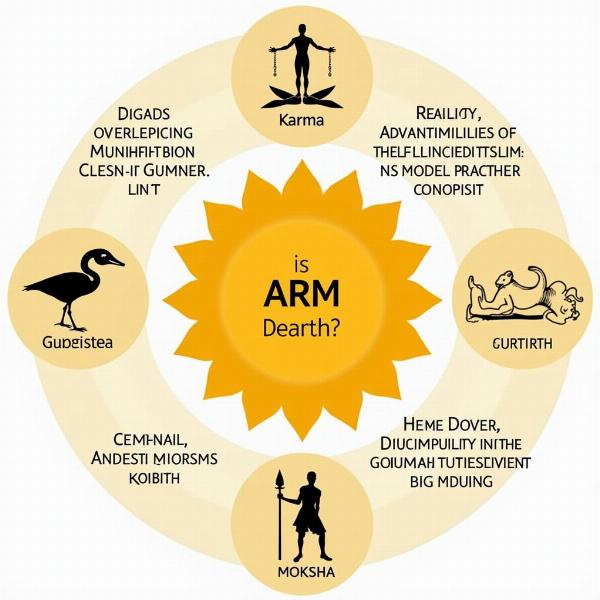The phrase “one day I will die” carries a profound weight, a universal truth we all share. Understanding its meaning in Hindi allows us to explore the cultural nuances and philosophical perspectives surrounding mortality within the Indian context. This article delves into various Hindi translations, exploring their subtle differences and the deeper implications they hold. We will also examine how this concept is viewed within Indian philosophy and spirituality, providing a richer understanding of “one day I will die meaning in Hindi.”
Exploring Hindi Translations of “One Day I Will Die”
Several Hindi phrases effectively capture the essence of “one day I will die.” Each offers a slightly different shade of meaning, reflecting the richness and complexity of the Hindi language. Some common translations include:
- Ek din main mar jaunga (एक दिन मैं मर जाऊँगा): This is a straightforward and commonly used translation, suitable for everyday conversations. It literally translates to “one day I will die.”
- Kabhi na kabhi to mujhe marna hi hai (कभी न कभी तो मुझे मरना ही है): This phrase emphasizes the inevitability of death. It translates to “someday or the other, I have to die.”
- Ek na ek din maut aani hi hai (एक न एक दिन मौत आनी ही है): This translation personifies death, stating that it will inevitably arrive one day. It means “one day or another, death will come.”
- Meri bhi mrityu hogi (मेरी भी मृत्यु होगी): This more formal and literary translation uses the word “mrityu” (मृत्यु) for death. It translates to “my death will also happen.”
The choice of translation depends on the context and desired level of formality. Understanding these nuances is crucial for accurate and culturally sensitive communication.
Cultural and Philosophical Perspectives on Mortality in India
Indian culture and philosophy offer a unique perspective on death, often viewing it not as an end but as a transition. Concepts like reincarnation and karma play a significant role in shaping how death is perceived. Death is often seen as a liberation from the cycle of birth and rebirth, a path towards moksha (मोक्ष), or liberation.
- Reincarnation (पुनर्जन्म): The belief in rebirth influences the understanding of death. It suggests that death is not the ultimate end, but a transition to another life.
- Karma (कर्म): The concept of karma emphasizes the consequences of one’s actions. It suggests that the quality of one’s next life is determined by actions in the present life.
- Moksha (मोक्ष): The ultimate goal in many Indian spiritual traditions is to achieve liberation from the cycle of birth and rebirth. Death is seen as a potential gateway to this liberation.
 Indian Philosophy and Mortality
Indian Philosophy and Mortality
How “One Day I Will Die” Relates to Everyday Life in India
The awareness of mortality is often interwoven into everyday life in India. Religious rituals, festivals, and even daily conversations can reflect this acceptance of death as a part of life. This understanding can foster a sense of detachment from material possessions and a focus on spiritual growth.
What does the phrase “one day I will die” mean in a spiritual context?
In a spiritual context, “one day I will die” can serve as a reminder of the impermanence of life, encouraging individuals to focus on their spiritual journey. It can inspire a deeper appreciation for the present moment and a detachment from worldly concerns.
How do people in India cope with the knowledge of death?
People in India cope with the knowledge of death through various spiritual practices, rituals, and community support. Faith, family, and a focus on the afterlife often provide comfort and solace.
Conclusion
Understanding “one day I will die meaning in Hindi” requires more than just a literal translation. It involves exploring the cultural, philosophical, and spiritual contexts that shape how death is perceived in India. This understanding can offer a valuable insight into the Indian worldview and its approach to life and mortality. The phrase serves as a poignant reminder of life’s fragility and the importance of living each day to the fullest.
FAQ
- What is the most common Hindi translation for “one day I will die”? The most common translation is “Ek din main mar jaunga (एक दिन मैं मर जाऊँगा).”
- How does Indian philosophy view death? Indian philosophy often views death as a transition, not an end, influenced by concepts like reincarnation and karma.
- What is the significance of “mrityu” (मृत्यु)? “Mrityu” is a more formal and literary term for death.
- How does the awareness of mortality influence daily life in India? It often fosters a sense of detachment from material possessions and a focus on spiritual growth.
- What is moksha (मोक्ष)? Moksha is liberation from the cycle of birth and rebirth, often seen as the ultimate spiritual goal.
- How is the phrase “one day I will die” interpreted spiritually? It serves as a reminder of life’s impermanence, encouraging a focus on spiritual development.
- How do people in India cope with the knowledge of death? Through spiritual practices, rituals, community support, and faith in the afterlife.
Meaning-Hindi.in offers professional Hindi translation services for various needs, including business documents, legal papers, technical manuals, websites, and educational materials. Our expert translators ensure accuracy and cultural sensitivity. Whether you need gust of wind meaning in hindi or shipments meaning in hindi, we provide high-quality translations tailored to your specific requirements. We also offer specialized services like nirvachan meaning in hindi, 2 years ago meaning in hindi, and chithappa meaning in hindi. Contact us today at [email protected] or +91 11-4502-7584 to discuss your translation needs. Meaning-Hindi.in is your trusted partner for all your Hindi language solutions.